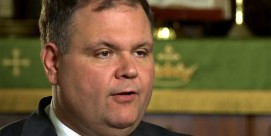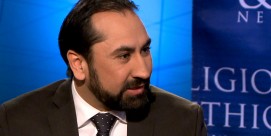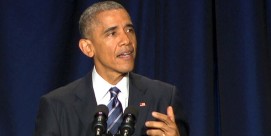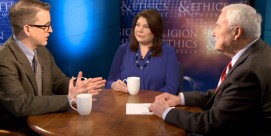In This Episode << SLIDE LEFT TO SEE ADDITIONAL SEGMENTS
2008 Campaign: Conventions Preview
FRED DE SAM LAZARO, guest anchor: The election season moves into high gear this week with the Democratic National Convention in Denver, followed by the Republican gathering in St. Paul. Religion continues to play an unusually prominent role in the campaigns, but not everyone is happy about that. According to a new survey from the Pew Research Center, a narrow majority of Americans – 52 percent -now say that churches and other houses of worship should keep out of politics. In 2004, only 44 percent thought that.
And while Republicans are most often seen as the party friendly toward religion, the Democrats have made some gains. Nearly four-in-10 Americans now say the Democrats are friendly toward religion, up from just 26 percent two years ago.
Meanwhile, religious groups continue trying to have an influence. A large rally of evangelical Christians was held on the National Mall in Washington last week. Organizers say more than 50,000 people gathered to pray for the nation and highlight moral issues they consider critical in the election. Among other things, there were calls for bans on abortions and same sex marriage.
At the conventions, and in coming weeks, both political parties have a lot at stake as they try to mobilize religious voters. Kim Lawton has our report.
KIM LAWTON: Every weekend, more than 20,000 people come to services at the evangelical Saddleback Church in southern California. Last Sunday (August 17), pastor and best-selling author Rick Warren urged his massive flock to carefully consider who to vote for in November.
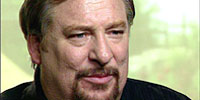
Rick Warren |
Reverend RICK WARREN (Pastor, Saddleback Church, during sermon): What we need in America more than visionaries, more than smart leaders, is we need leaders with character.
LAWTON: On the previous evening, both Barack Obama and John McCain were at Saddleback making their case to be the next president. As part of the discussion, Warren asked them to describe what their Christian faith means to them.
Senator BARACK OBAMA (Democratic Presidential Candidate at Saddleback Forum): It means I believe in – that Jesus Christ died for my sins and that I am redeemed through him. That is a source of strength and sustenance on a daily basis.
Senator JOHN MCCAIN (Republican Presidential Candidate, at Saddleback Forum): Means I’m saved and forgiven. And we’re talking about the world. Our faith encompasses not just the United States of America, but the world.
LAWTON: Georgetown University professor of government Clyde Wilcox says faith can tell voters a lot about a potential president.

Clyde Wilcox |
Professor CLYDE WILCOX (Government Department, Georgetown University): How will we know how anyone will behave in a crisis? Well, we can look at past behavior, but we can also think, what is it that are their bedrock values, that they don’t want to change? And for most Americans those values would be religious.
LAWTON: As Democrats and Republicans head to their national conventions, both camps are actively competing for religious voters. The candidates are talking about their personal faith, and the campaigns are developing wide-ranging strategies for faith-based outreach.
It’s somewhat unfamiliar territory for the Democrats who’ve been criticized in recent presidential elections for appearing not friendly toward religion. This time around, Democrats promise things will be different.
The chief executive officer of the Democratic National Convention in Denver is Leah Daughtry, a fifth-generation Pentecostal pastor. As part of the convention, Daughtry has planned an interfaith prayer gathering and other faith-related events.
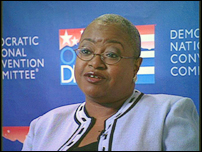
Leah Daughtry |
Reverend LEAH DAUGHTRY (CEO, Democratic National Convention): All of us have values. We all come to our lives with a certain set of values. For many of us, those values spring from a place of faith. So what we want people to walk away with is understanding that this is just another part of the Democratic Party.
LAWTON: She acknowledges that hasn’t always been the Democratic image in recent years.
Rev. DAUGHTRY: It was a puzzling phenomenon to me to see the party that I’ve always been a member of labeled as a party that doesn’t have people of faith or isn’t open to people of faith. So I think for me it was really more about us as a party saying, “No, wait a minute. We are people of faith. There are millions of us.” We became more vocal. We decided to stand up. We decided to stand up for what we believe and to say, “This is who I am. I’m inside the party. I’m a person of faith.”
LAWTON: One key part of the new Democratic strategy has been reaching out to evangelicals, a longtime constituency of the GOP. Obama has been appealing to those voters using God-talk and biblical references.
Sen. OBAMA (at Saddleback Forum): We still don’t abide by that basic precept in Matthew that whatever you do for the least of my brothers, you do for me.
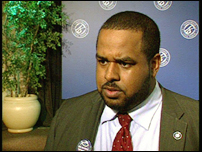
Joshua Dubois |
JOSHUA DUBOIS (Director, Religious Affairs, Obama Campaign): We’re very humble in our approach to the outreach. We’re certainly not hoping to win outright the evangelical vote, but we are certainly going to make a serious effort to introduce Senator Obama and his values to the nation, and I think a lot of folks are going to respond to that.
LAWTON: Growing numbers of evangelicals want to expand their agenda beyond abortion to also include issues like poverty, AIDS, and the environment.
Rev. WARREN: What I’m hearing is, you know, not lock-step in Republicanism. That’s what I’m hearing. I’m not hearing people saying, “Well, I’m going to move away from life.” But I am hearing people saying, “I’m moving away from just pulling a lever.”
LAWTON: Evangelicals are the single largest bloc of religious voters. In 2004, 40 percent of George Bush’s total vote came from social conservatives. New polls show the majority of those voters are supporting John McCain, but not with the same level of enthusiasm they gave George Bush. And there are still significant numbers of undecided evangelical voters. If the Obama campaign can siphon off some of those evangelicals, it could make a big difference, especially in a close election.
John McCain has had a rocky relationship with evangelicals, including some highly publicized rifts with religious right leaders going back to the 2000 elections. Many conservative evangelicals have been frustrated that McCain has not spoken more about his faith or emphasized their key social issues, such as abortion and gay marriage.
Political observers say McCain can’t automatically rely on the faith outreach strategy that worked so well for George W. Bush.
Prof. WILCOX: By the issues, social conservatives should still support him. But a generation of Christian right leaders has been increasingly ineffective and older. And I think the McCain campaign is not really geared up for that yet, so I think they’ll have a little bit more problem.
LAWTON: At a news conference last week, social conservatives urged the McCain campaign to do more to mobilize their movement.
TONY PERKINS (President, Family Research Council, speaking at news conference): It’s not an issue of whether most evangelicals are going to vote for John McCain. It’s an issue of intensity. It’s an issue of excitement. It’s an issue of passion.
Sen. MCCAIN (at Saddleback Forum): I will be a pro-life president and this presidency will have pro-life policies.
LAWTON: Many evangelicals hope McCain will expand his Saddleback forum comments at the Republican convention and beyond.
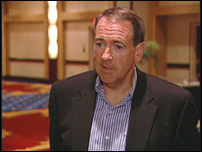 Mike Huckabee |
Governor MIKE HUCKABEE (Former Republican Presidential Candidate): I think the Republicans are going to see increasing numbers of people rally around John McCain. They’re comfortable with his own depth of personal character, his faith, his honor, and they know that his positions really do reflect more of what they believe to be important.
LAWTON: While evangelical voters have been getting most of the attention, Roman Catholics will also be crucial in this election. In 2004, a slight majority of Catholics voted for Bush, but then in the mid-term elections in 2006 a slight majority swung back to the Democratic side. Both candidates are still refining their Catholic outreach strategies.
Prof. WILCOX: Older Catholics if they are more religious tend to vote more Democratic. Younger Catholics if they are more religious tend to vote more Republican. And so this has been, this will be a really key constituency.
LAWTON: Another challenge will be reaching out to communities of faith while not alienating other voters. This is an especially complex question for the Democrats.
Prof. WILCOX: They do have a secular part of their voting bloc, maybe 20 percent of Americans are seculars, another 10 percent are religious but don’t like to hear religion and politics mixing. Some are Jews who don’t want to hear Christian politics mentioned so much.
LAWTON: Daughtry says this hasn’t been an issue for them so far.
Rev. DAUGHTRY: We really haven’t had, you know, blowback from people who are afraid we going to make this the church of the Democratic Party. It’s all a value system. We’re not basing our values as Democrats on a holy text. We’re basing it on a value system of how we love and treat and care for each other in community.
LAWTON: As the campaign outreach strategies move forward, some observers worry about the potential impact on religious communities.
Prof. WILCOX: The mission of a church is not really to elect a candidate. The mission of a church or a synagogue or a mosque or whatever is to, you know, reach out to their congregants and provide them with guidance and advice, and oftentimes politics can interfere with that.
LAWTON: Rick Warren doesn’t endorse candidates, but I asked him if he was worried about religious voters becoming another special interest group.
Rev. WARREN: Well, it is an interest group. Sorry to say that, but it is an interest group. And it happens to be probably the largest interest group. I mean, unions are an interest group. Teachers are an interest group. Gays are an interest group. So should only other interest groups be allowed to have the candidates come to their venues?
LAWTON: He says people of faith should – and will – be a factor at the polls this fall.
Rev. Warren (during sermon): And I don’t understand when people say, “I don’t like any of the candidates so I’m not going to vote.” Oh come on! Then you need to move to another country, really, and you need to see what it’s like to not have real freedoms and not to be able to have a voice.
LAWTON: Both campaigns plan to work overtime to capture those votes. I’m Kim Lawton reporting.


